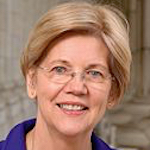 |
| Elizabeth Warren |
“I’m Mike Wallace and I’m from 60 Minutes.” Those words were once feared by CEOs across the land.
During the 1990s, there were plenty of crisis PR workshops about what to do when Mike Wallace and his camera crew show up unannounced at corporate headquarters. Slamming the door and turning out the lights may have been the best strategy.
Today there’s a new sheriff in town, one more likely to fire off a letter than to make a dramatic TV photo-op.
That missive begins with “I write to express concern” and Senator Elizabeth Warren is that concerned corporate watchdog.
The Massachusetts Democrat on Oct. 13 set her sights on Walt Disney Co. chairman Bob Iger and CEO Bob Chapek.
She expressed her concern about their decision to “lay off 28,000 workers during an economic recession, while reinstating pay rates for highly compensated senior executives.” Ouch.
Warren shredded Disney’s argument that California’s decision to keep Disneyland closed due to the COVID-19 pandemic triggered the job cuts.
She said 6,400 of the workers were laid off in Florida, along with another 8,857 part-timers.
In April, Disney’s top executives took salary cuts of 20 to 30 percent, but pay was restored in August, a month before the company’s Sept. 29 announcement of 28,000 layoffs.
The Senator blasted the huge total compensation packages hauled in by Iger ($47M in 2019) and Chapek ($22.5M) and the billions ($47.9B from 2009-2018) spent to repurchase stock, “a practice that is known to turn excess cash into higher stock prices for the benefit of shareholders.”
In the years leading up to the COVID-19 crisis, “Your company prioritized the enrichment of executives and stockholders through hefty compensation packages and billions of dollars’ worth of dividend payments and stock buybacks, all of which weakened Disney’s financial cushion and ability to retain and pay its front-line workers amid the pandemic,” wrote Warren.
She took Chapek to task for saying earlier this year: “Our ability to do good in the world starts with our cast members….who create magic every day. Our commitment to them will always be our top priority.”
Warren responded: “Yet it appears that—prior to, and during the pandemic—Disney took good care of its top executives and shareholders and now is hanging its front-line workers out to dry.”
Mickey and Minnie have a friend in Warren.
More than 140 professionals signed on for the Oct. 14 launch of the 100kPledge (The100kPledge.com) online “pledgistry,” the first public record of racial justice initiatives that enable companies and individuals to commit and track progress to improving economic opportunities for Black communities by 2030.
The 100KPledge is a digital social contract that hosts a sortable public record, where a counter displays total dollar amounts committed and progress made to meeting the goal. It operates on an honor system.
The 100KPledge started with $45B in commitments. They include pledges from Twitter founder Jack Dorsey ($1B), Salesforce ($410M), Michael Jordan ($100M), Verizon ($10M), Cisco ($5M), TikTok ($4M) and Yum Brands ($3M).
The100KPledge is the brainchild of Vijay Chattha (founder of VSC strategic communications/content firm), Paras Shah (strategy director at Different Strokes) and Nihal Mehta (founding general partner at Eniac Ventures).
Hats off to them.
Online retail sales catch COVID-19 fever. FTI Consulting predicts a 25 percent surge in online US retail sales to $748B, powered by the pandemic and months of stay-at-home orders.
It would be the strongest growth for online retail sales since 2006, when the channel was still in its infancy.
Pre-pandemic, FTI had forecast 2020 online retail sales of $677B.
“We have seen a surge in online commerce and a quickened pace of retail store closings throughout the country due mostly to the forced adoption of online shopping by housebound consumers,” said Christa Hart, senior managing director in FTI’s retail & consumer products practice.
FTI now expects online retail sales will hit the $1T market by 2023, a year earlier than its earlier projection.
The firm does not anticipate the torrid growth pace of 2020 to continue. It expects growth will decelerate to the low double-digit rates over the next several years.


 The techniques deployed by OJ Simpson's defense team in the "trial of the century" served as a harbinger for those used by Donald Trump... People worry about the politicization of medical science just as much as they fret about another pandemic, according to Edelman Trust Barometer... Book bans aren't restricted to red states as deep blue Illinois, Connecticut and Maryland challenged at least 100 titles in 2023.
The techniques deployed by OJ Simpson's defense team in the "trial of the century" served as a harbinger for those used by Donald Trump... People worry about the politicization of medical science just as much as they fret about another pandemic, according to Edelman Trust Barometer... Book bans aren't restricted to red states as deep blue Illinois, Connecticut and Maryland challenged at least 100 titles in 2023. The NBA, which promotes legalized gambling 24/7, seems more than hypocritical for banning player for placing bets... Diocese of Brooklyn promises to issue press release the next time one of its priests is charged with sexual abuse... Truth Social aspires to be one of Donald Trump's iconic American brands, just like Trump University or Trump Steaks or Trump Ice Cubes.
The NBA, which promotes legalized gambling 24/7, seems more than hypocritical for banning player for placing bets... Diocese of Brooklyn promises to issue press release the next time one of its priests is charged with sexual abuse... Truth Social aspires to be one of Donald Trump's iconic American brands, just like Trump University or Trump Steaks or Trump Ice Cubes. Publicis Groupe CEO Arthur Sadoun puts competition on notice... Macy's throws in the towel as it appoints two directors nominated by its unwanted suitor... The Profile in Wimpery Award goes to the Ford Presidential Foundation for stiffing American hero and former Wyoming Congresswoman Liz Cheney.
Publicis Groupe CEO Arthur Sadoun puts competition on notice... Macy's throws in the towel as it appoints two directors nominated by its unwanted suitor... The Profile in Wimpery Award goes to the Ford Presidential Foundation for stiffing American hero and former Wyoming Congresswoman Liz Cheney. JPMorgan Chase chief Jamie Dimon's "letter to shareholders" is a must-read for PR people and others interested in fixing America and living up to its potential... Get ready for the PPE shortage when the next pandemic hits... Nixing Netanyahu. Gaza carnage turns US opinion against Israel's prime minister.
JPMorgan Chase chief Jamie Dimon's "letter to shareholders" is a must-read for PR people and others interested in fixing America and living up to its potential... Get ready for the PPE shortage when the next pandemic hits... Nixing Netanyahu. Gaza carnage turns US opinion against Israel's prime minister. Trump Media & Technology Group sees Elon Musk's X as an option for those who want the free expression promised by Truth Social but without Donald Trump, owner of 57.3 percent of TMTG... Chalk one up for "anti-woke warrior" governor Greg Abbott as University of Texas lays off 60 DEI-related staffers... Five percent of Americans see the US as its own worst enemy, according to Gallup.
Trump Media & Technology Group sees Elon Musk's X as an option for those who want the free expression promised by Truth Social but without Donald Trump, owner of 57.3 percent of TMTG... Chalk one up for "anti-woke warrior" governor Greg Abbott as University of Texas lays off 60 DEI-related staffers... Five percent of Americans see the US as its own worst enemy, according to Gallup.


 Have a comment? Send it to
Have a comment? Send it to 
No comments have been submitted for this story yet.